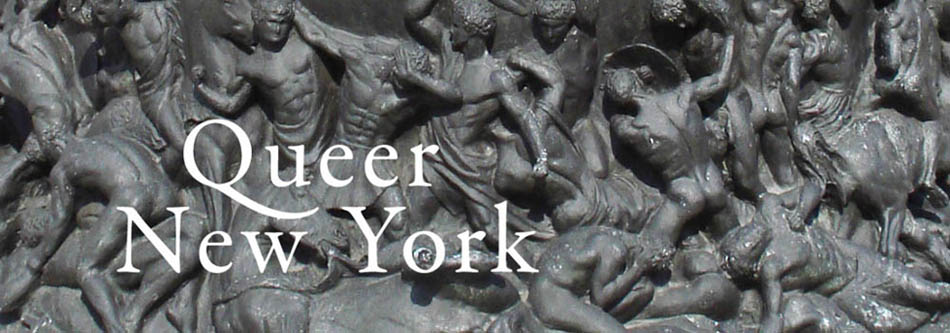I am probably coming to the party a little late, since Next Fall started life off-Broadway as a Naked Angels production, where it enjoyed a long run and several extensions. Elton John and David Furnish stepped in at some point to produce it on Broadway, specifically the Helen Hayes Theatre, where I hope it enjoys another good long run.
Written by long-time Naked Angels company member Geoffrey Nauffts, the play centers on Adam (Patrick Breen) and Luke (Patrick Heusinger) as they work to maintain a relationship despite substantial differences in age and religious belief. Luke, the younger man, strives to balance his gay identity with his devout born-again Christian faith. From their first date and throughout their relationship, Adam, an atheist, is frankly baffled by Luke's beliefs, and can't resist chasing Luke's line of reasoning to conclusions he finds reprehensible. Luke tries to avoid the discussion most of the time, but when pushed admits he hopes Adam will accept Jesus before it's too late, so they can go to heaven together. Many of Adam's friends slowly pull away from im, not sure why he puts up with it. Complicating all this still further is the fact that Luke, while openly gay in most arenas of his life, is still not out to his equally devout parents.
All these issues come to a head when Luke is hospitalized following an accident. In the waiting room we meet his divorced parents Butch (Cotter Smith) and Arlene (Connie Ray), his and Adam's friend Holly (Maddie Corman), and Luke's estranged friend Brandon (Sean Dugan), a fellow gay Christian who Adam is surprised to find was still listed as Luke's emergency contact.
As politically fraught as all this may sound, the play is not a message play. Real people with deeply held beliefs are portrayed effectively, so the conflicts that come out of irreconciliable differences ring true. Early on I worried a bit that the southern Christians might get short shrift but ultimately the characters are painted honestly and truthfully. Butch, the devout middled-aged father, most often says the things likely to enrage the audience, but Nauffts deftly keeps him from becoming a cartoon villian. One line which took my breath away for its casual economy of bigotry (racism and homophobia in one five-word question) doesn't seem over-the-top, especially since it derails Luke's attempt to come out to his dad. How many times in your coming out experience did a loved one--perhaps unconsciously sensing what you were working up to--suddenly find a reason to say 'fag'? I can think of at least three times personally. Humanizing Butch still further, he has one of the most wrenching moments onstage, which on the night I saw it triggered substantial sniffling in the audience.
There were a few moments when the writing took me out of the action. Though we don't see it happen, Luke's and Adam's unneeded Heimlich maneuver is a meet-cute that strained my credulity, and near the end there is a moment I'm still on the fence about, uncertain what it adds to the action, no matter how realistic it might be (sorry to be so cagey, but it would be a spoiler to say more; after you see the play, we'll discuss). But over all the dialogue rings very true; every character reminds me of someone I know, every argument sounds like arguments I've had. I don't think this play will necessarily change anyone's view, but I don't ask it to.
Each of the characters is finely etched by writer and actor, and having people with such widely different viewpoints connected to one another never seems outlandish. The actors also jell into an exceptional ensemble. This is a good place to mention how refreshing it was to see a production move from off-Broadway to Broadway with no change in the cast. The producers recognized that the special alchemy of this ensemble was central to the play's success, and resisted the temptation to bring in stars or 'names'. Patrick Breen and Cotter Smith may deserve special mention, but that may have as much to do with the fact that they represent the extreme--and most rigid--poles of the struggle, as it does with the high caliber of their work. Wilson Chin's set design works beautifully, flowing effortlessly through several locations in a way that delights the eye, but doesn't demand more than its share of stage time. It is a failing of mine that I often fail to notice lighting designs, but I'd say this is in part because when it works well, it disappears, especially in naturalistic plays like this one. That said, Jeff Croiter's design did catch my attention in positive ways (a city skyline and sunlight flickering through Autumn leaves are two moments), and it never caught my attention in negative ones (being unable to see what is happening on stage for example, a more common problem than it should be). I will be surprised if this production doesn't receive a Tony nomination. It deserves it.
[Photo was taken from the Next Fall webpage. Credit for the image either goes to Spotco Advertising, or to BONEAU/BRYAN BROWN. I couldn't establish any more than that.]
Subscribe to:
Post Comments (Atom)




No comments:
Post a Comment